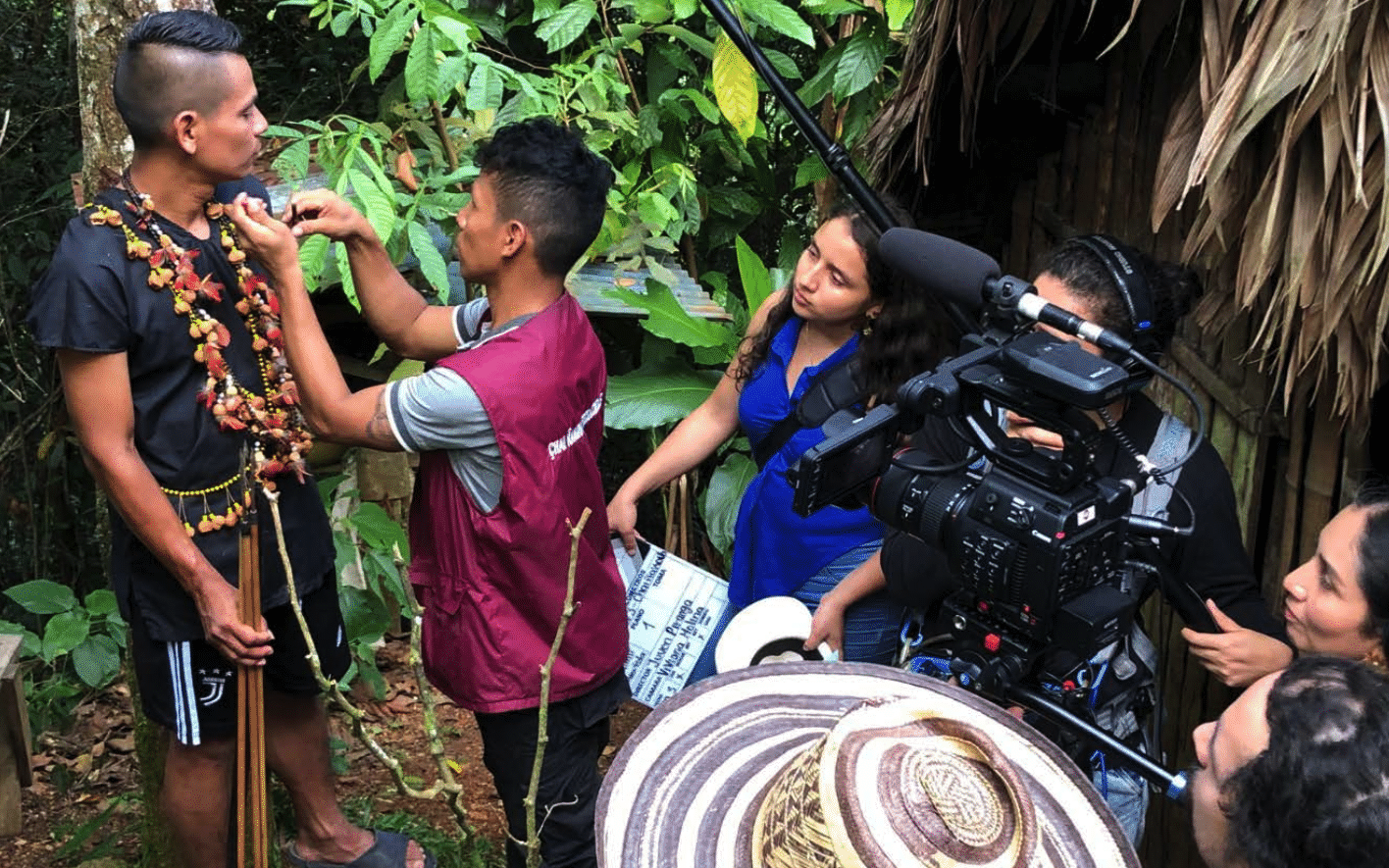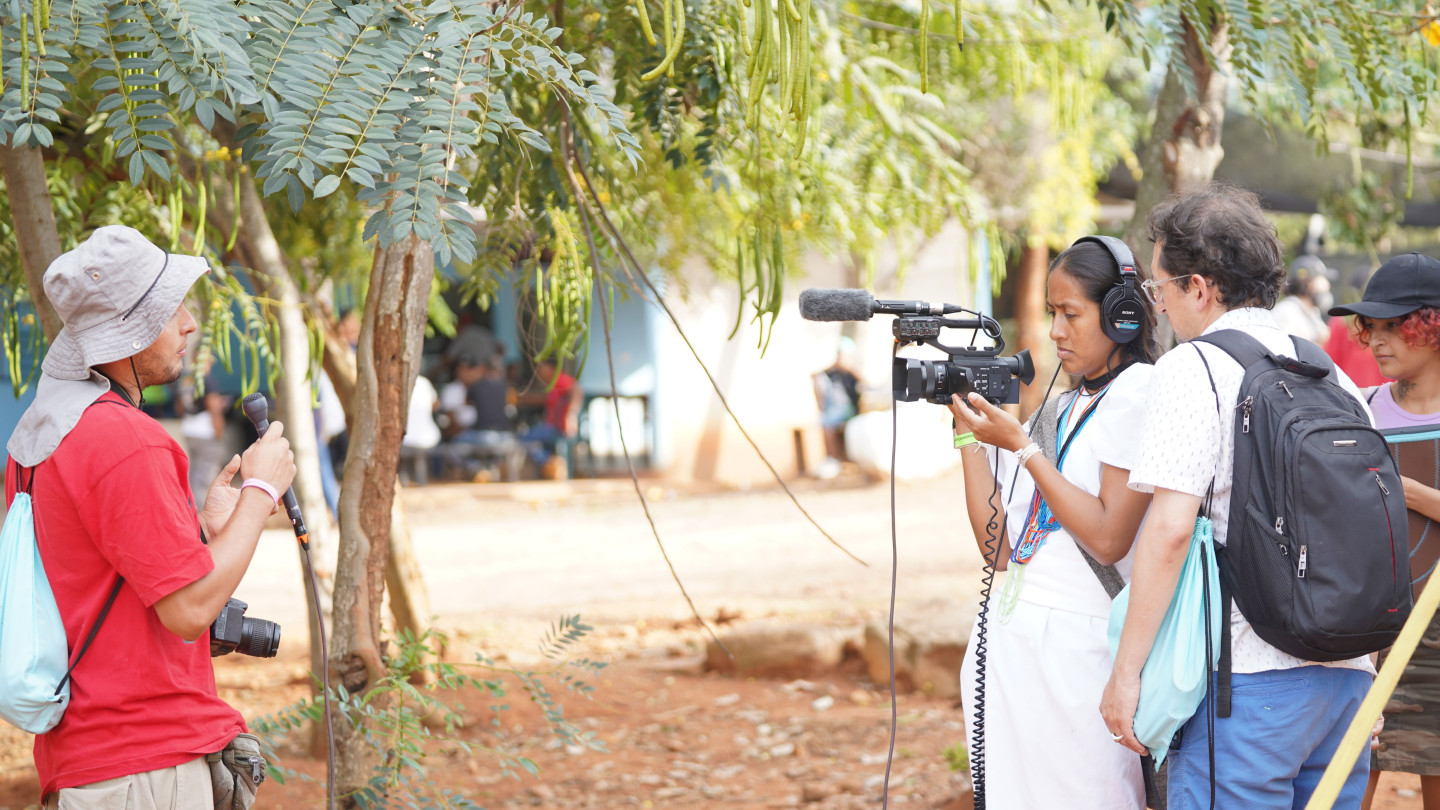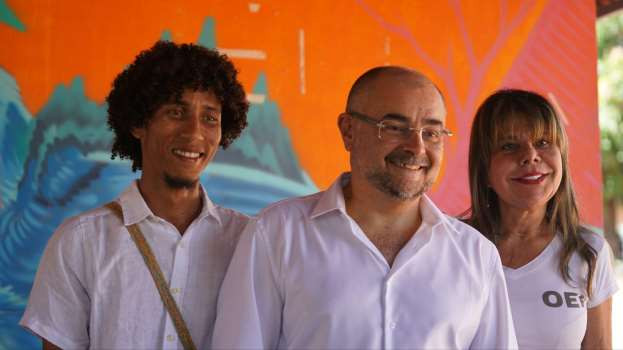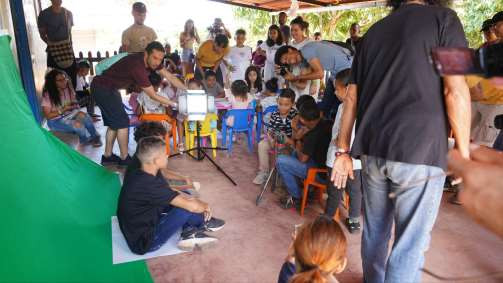Can you imagine a place where historically marginalized communities in Colombia teach an international audience what it means to build peace through art? An event where they are not only the protagonists but the hosts, and where their stories are the ones being understood and discussed?
Although the ex-combatant population has received significant international support for projects that allow them to meet immediate economic needs, cultural opportunities are limited or nonexistent. The first International Community Film Festival, organised by Historias En Kilómetros, La Rotativa, EUNIC Colombia and the EU Delegation to Colombia, set the stage to bring the reality of the ex-combatants amid a cultural offer that engages the young population. The festival has been promoting the creation of audiences in these new generations and has a pedagogical offer tailored to them. Moreover, it is more than a festival but also a peace lab and the immaterial reparation of a territory.
I spent 25 years in the guerrilla fighting for the promise of a better Colombia. The festival shows me that the fight has been worth it. This festival allowed us to vindicate ourselves and recover our dignity, to show what we have done after laying down our weapons.
Pólvora, logistics volunteer from the Tierra Grata community
EUNIC Colombia has had a year-long alliance with Historias en Kilómetros (HEK) and the Colombian Truth Commission (CTC). Together they have trained community filmmakers to become sustainable production companies. These filmmakers were ready to host this festival. Tierra Grata, one of 24 so-called Territorial Training and Reintegration Spaces, hosted this unique gathering, as a community born with the Colombian peace process, where former FARC guerrillas laid down their weapons and transitioned to civilian life. The festival brought together local production companies from the regions most affected by the armed conflict to show the work they have created with the CTC.
The Festival was consolidated as a space for reconciliation, highlighting the work that the peace signatories have done for their reintegration into civil society. This commitment to the decentralization of culture mobilized more than 30 tons of technical equipment for light, sound, and general infrastructure. The
logistical challenge could be carried out thanks to the participation of more than 100 community members.
It took place in Tierra Grata from 11 to 13 November and was presented as a story that of three acts in three days, including an intense and varied programme of film screenings, workshops, panels, all around their core values of peace building:
- Act I - Who We Were: A journey through the process of laying down weapons of the former FARC and their transition to civilian life
- Act II - Who We Are: A day that will reveal how a community is built and how community cinema is produced
- Act III - Who We Will Be: A day to talk about the new generations and the dream of a dignified home.
An international network of community film makers building peace through art
The festival's programming included workshops, panels, an official community short and feature film competition, and the launch of the documentary series “Somos Historias,” which highlights processes of cultural resistance to the armed conflict. The festival featured community films from around the world that give voice to marginalized communities affected by various forms of violence.
The jury, made up of filmmakers, signatories of the Peace Agreement and artists, evaluated 265 films from more than 37 countries in the categories “Peace, memory and reconciliation”, “Beyond stigma” and “Cinema-memory for boys and girls”. The official selection brought together 28 short and feature films from around the world. More than half have female directors or mixed co-direction teams.
We are peace signers, ex-combatants who arrived with a backpack, a weapon on our shoulders, and from then on we built our own habitat in a new territory, a rooting from scratch. Cinema would revive our history in the territory. This is very important for our children, who knew us with arms, and know they'll see through us how peace can be built.
Yakelin Yajur, signer of peace and leader in the Tierra Grata community.
Primary audience of the festival are the communities affected by the armed conflict in Colombia: ex-combatants, Afro-Colombian men and women, indigenous communities, farmers, LGBTIQ communities, and the urban youth. The local producers come from these communities and have become their cultural representatives.
The most important innovative aspect of the project is creating a horizontal relationship between local Colombian producers and national and international professionals, allowing the Festival to be built on a bilateral basis. In terms of content, the activities were designed in conjunction with the community of Tierra Grata, who will host the festival and present its own stories to international filmmakers. The decentralized location chosen allowed the festival to reach areas where there is a lack of cultural projects due to scarce resources. It reinforced the institutional presence in these territories and made them visible for international social initiatives.
Holding this festival in this space is being able to tell society that the peace process is a success. Being able to show Colombian society and the children who grew up seeing their parents in arms, who are now hosting a community film festival. It is the possibility of starting to build a new history and narrative through culture.
Yarledis Olaya, community leader of Tierra Grata
Tierra Grata is the first community of ex-combatants to consolidate itself thanks to its self-management and has become "the first city of peace." In addition, the inhabitants of Tierra Grata and neighboring villages host the guests and provide the food and all other products for all the festival's needs. The festival aims to become a reference for cultural initiatives for peace processes for the guest countries amid their own peace processes.
Whilst preparing the final proposal, the project team's visit to Tierra Grata in October 2022 was essential for developing the methodology for the first edition of the festival, as the different actors involved in the project met and worked face-to-face. Together, they contributed to the construction of the proposal and ensured the different actors involved were at the same starting point regarding how they viewed, understood, and planned to achieve this project.
The main result of the visit was that it allowed the international community to get to know the Tierra Grata territory, its history, and its organizational processes. All actors involved developed and defined the main objectives and activities that took place during the festival, guaranteeing a sustainable impact, and with that, the central role each of the partners played based on a horizontal dialogue.
Speaking of peace in a historically invisible area
Our initial objective was to build a decentralized space for an international network of community filmmakers that promoted community cinema as a tool to support peace processes like the one in Colombia. We feel that this objective was not only fully met, but that it exceeded our expectations, generating interregional and international alliances between community filmmakers that will foster professional community cinema. Having managed to make a festival that spoke of peace in a historically invisible area of the country, allowed all participants and beneficiaries to imagine spaces of this magnitude in other decentralized areas of Colombia.
The community of ex-combatants of Tierra Grata demonstrated the ability to host an event of magnitude never before seen in the community, which allows them to present themselves as a space for events that celebrate artistic freedom of expression, social cohesion, and equality for the future.
This project is a very strong symbol of the bridge that can be built between art and peace, here in Tierra Grata, the ETCR that from the beginning has been one of the symbols of the success of the reincorporation process.
Gilles Bertrand, EU Ambassador to Colombia
The festival is now a pioneer in building a solid partnership between community filmmakers, EUNIC members, and communities of ex-combatants as a symbol of the sensitivity and solidarity of the European community in supporting the peace process in the country. This festival has created the framework for future editions, putting the festival forward as an annual meeting for an international network of community filmmakers. The decentralized location chosen allowed the Festival to serve as inspiration for other marginalized areas where cultural projects are lacking due to scarcity of resources.




